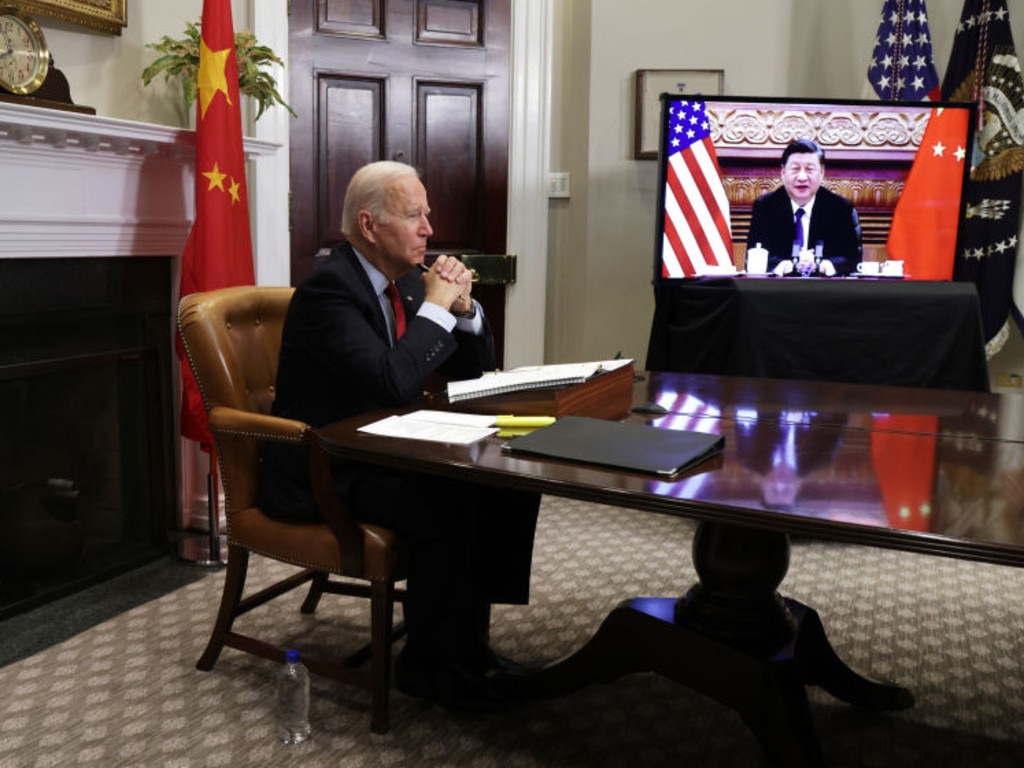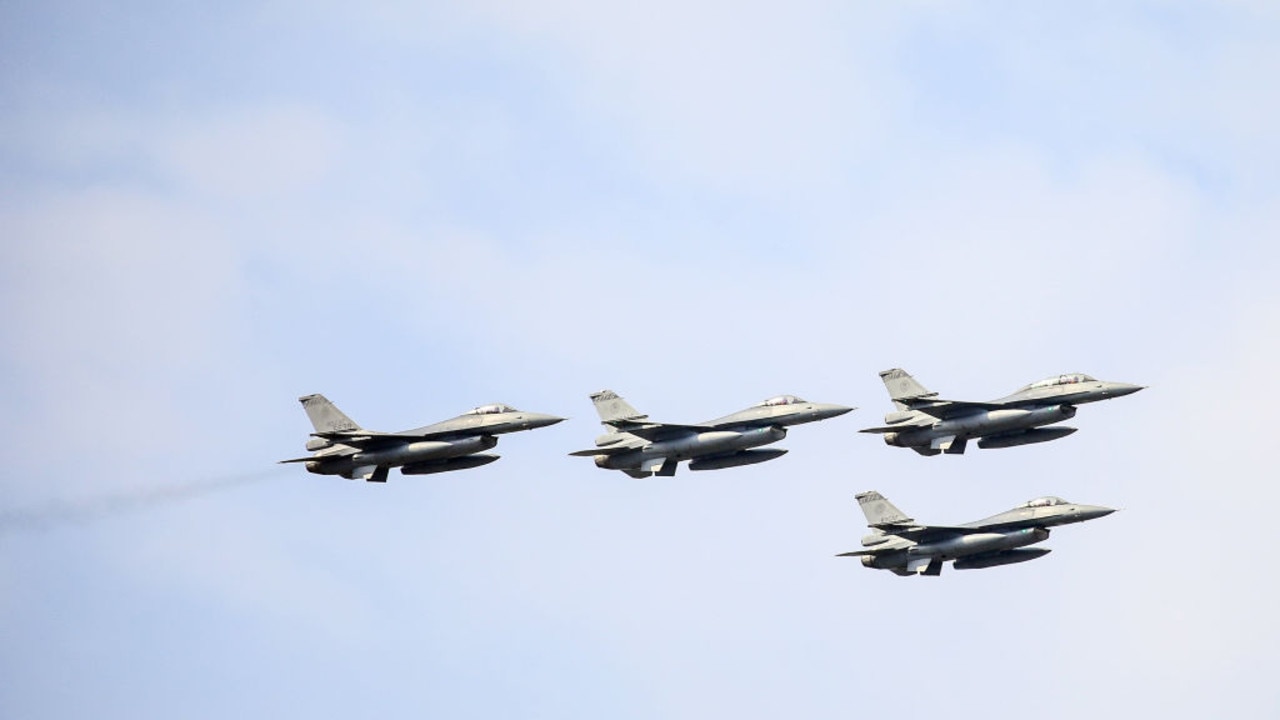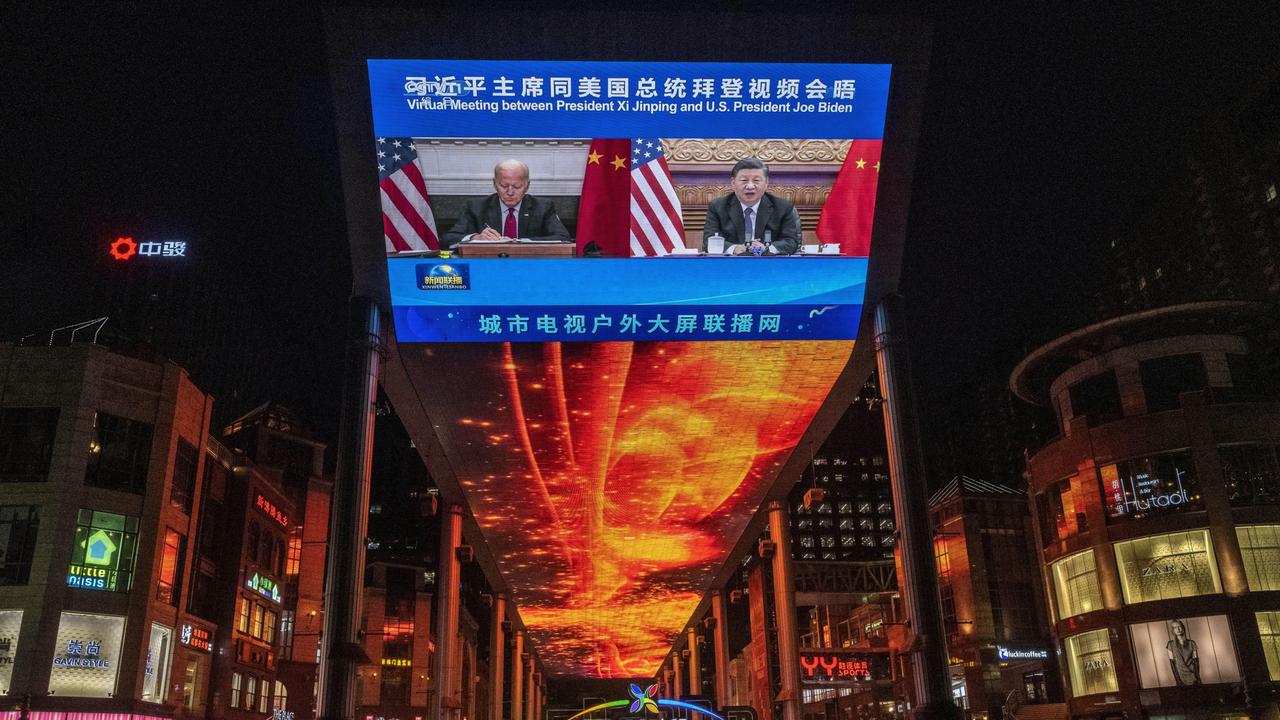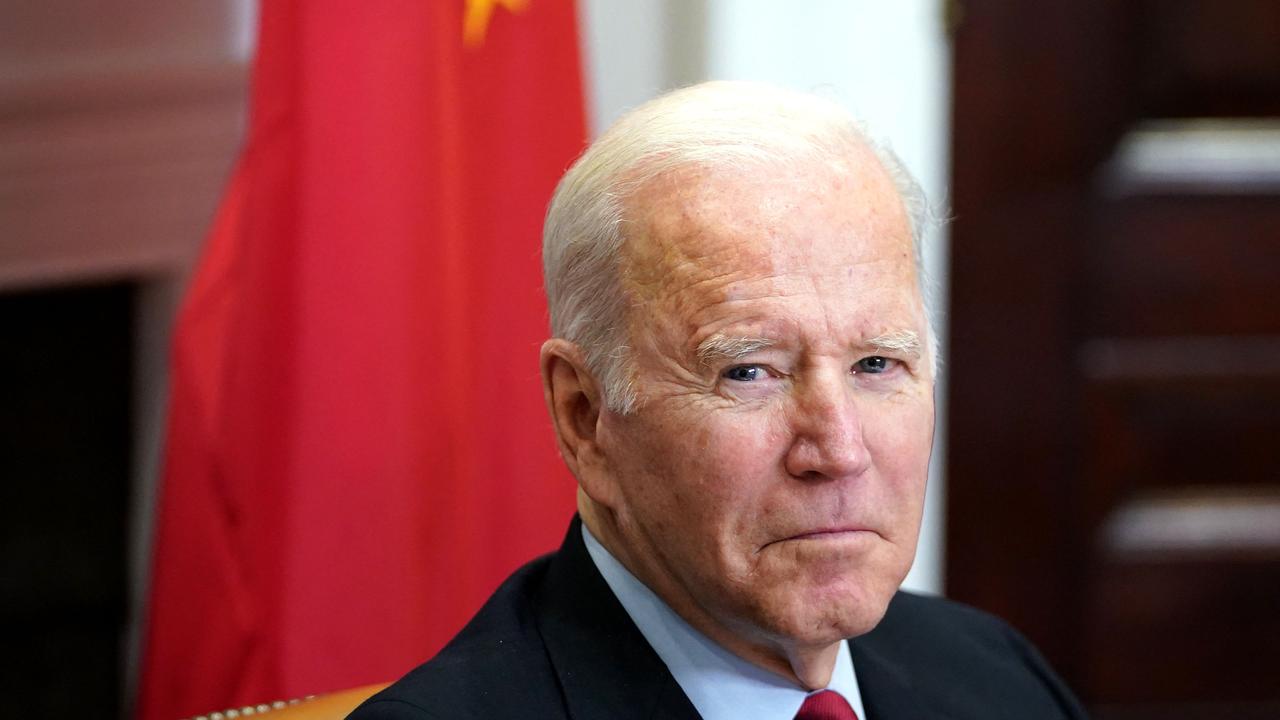Key takeaways from Joe Biden’s face-to-face with Xi Jinping
US President Joe Biden and China’s Chairman Xi Jinping meeting appeared to go well. Then Biden said seven dangerous words.
It started with the best of intentions. President Joe Biden met face-to-face (in a virtual kind of way) with Chairman Xi Jinping. The idea was to thaw the two great powers’ frigid relations. What they got was rigidly defined areas of doubt and uncertainty. And Taiwan remains just one accident away from crisis.
Biden was at the White House in Washington. Xi was in Beijing’s Great Hall of the People.
It’s a pride thing. And practical – given the Covid-19 pandemic.
The world got to see smiling faces as pleasantries were exchanged. The unpleasant matters of great power competition, however, were for the two leaders and their entourages.
The virtual summit was, after all, called at a time of heightened tensions.

Communist China considers the assimilation of the Republic of China (Taiwan) to be unfinished business. Its fuzzy borders with India, the Philippines, Vietnam, Malaysia, Indonesia and Japan are “sacred and inviolable”.
The American republic of the United States has had its world’s policeman cap on, elbowing its aircraft carrier battle groups through what it defines as international waters. As well as moving to arm China’s growing list of aggrieved neighbours.
Biden “underscored that the United States will continue to stand up for its interests and values”. He highlighted concerns over human rights, trade, and freedom of navigation.
Xi then told Biden that “the Chinese people’s aspiration for a better life is the biggest internal driver for China’s development and an inevitable trend of history. Any attempt to stop this historical trend will be rejected by the Chinese people and will by no means succeed.”
After three-and-a-half hours of “incredibly direct, candid” (according to the White House) and “thorough and in-depth communication” (according to Beijing), nothing appeared to have changed.
“It was not about ‘making up’,” says Flinders University China analyst Dr Michael Sullivan. “The summit was about agreeing to disagree and to agree to compete with each other short of conflict.”
In the Balance
Xi stressed that disputing Communist China’s control of Taiwan remains a bright red line.
“Such moves are extremely dangerous, just like playing with fire,” he reportedly said. “Whoever plays with fire will get burnt. “
Then came a recommitment to uncertainty.
“The one-China principle and the three China-US Joint communiques are the political foundation of China-US relations.”
Xi then outlined what he believes this means.
“The true status quo of the Taiwan question and what lies at the heart of one China are as follows: there is but one China in the world, and Taiwan is part of China, and the Government of the People’s Republic of China is the sole legal government representing China.”

Democratic Taiwan represents part of the Republic of China that never surrendered to the Communist-led revolution in 1949. And Biden left open the notion that perhaps Taipei is the “One China” he is referring to. Not Beijing.
Biden insisted that Washington “remains committed to the ‘One China’ policy, guided by the Taiwan Relations Act, the three Joint Communiques, and the Six Assurances, and that the United States strongly opposes unilateral efforts to change the status quo or undermine peace and stability across the Taiwan Strait.”
That’s not the problem it may seem, says Dr Sullivan.
“Commitment and recommitment to the One China Policy’ since the Shanghai Communique in 1972 is all China requires,” he says. “Biden recommitted the US to that principle. Xi wanted to hear that and got it. Xi’s threats are China will react if the US abrogates the ‘One China Policy’ in favour of Taiwan independence.”

Immediately the summit ended, China’s state-controlled media broadcast said that Biden had affirmed the US did not support Taiwan’s independence.
But, even as the report went to air, Biden tripped over the rigid boundary of doubt and uncertainty that some call “strategic ambiguity”.
He started well: “We made it very clear we support the Taiwan Act, and that’s it”.
He then crossed a red line: “It’s independent, he said. “It makes its own decisions”.
“The Chinese must be shaking their heads in despair,” says Dr Sullivan, “but they will not react beyond that. Misspeaking off the cuff does not carry the same weight as the restatement by Biden of the One China Policy to Xi.”
‘Simple, Straightforward Competition’
War was on both leaders’ minds. Biden told Xi that the two of them must find ways to de-escalate tensions: “We need to establish some commonsense guardrails”, he said. “it seems to me our responsibility as leaders of China and the United States is to ensure that the competition between our countries does not veer into conflict, whether intended or unintended. Just simple, straightforward competition.”
Xi reiterated to Biden that he had boundaries. He described the two great powers as “two ships that should not collide”.
He complained that the US was “abusing or overstretching the concept of national security to suppress Chinese businesses” and pushed back against human rights criticisms.
But, according to the state-run Xinhua news service, President Xi “stressed that opening-up is a fundamental state policy and a hallmark of China. China will not change its determination to open up at a higher level. China will not change its determination to share development opportunities with the rest of the world. And China will not change its determination to make economic globalisation more open, inclusive, balanced and beneficial to all.”
Biden also didn’t back down.

He “underscored that the United States will continue to stand up for its interests and values and, together with our allies and partners, ensure the rules of the road for the 21st century advance an international system that is free, open, and fair” a White House summary reads. “He emphasised the priority he places on far-reaching investments at home while we align with allies and partners abroad to take on the challenges of our time. President Biden raised concerns about the PRC’s practices in Xinjiang, Tibet, and Hong Kong, as well as human rights more broadly.”
Dr Sullivan says this represents an agreement to disagree.
“The terms and conditions of such competition are not agreed to, nor will they be,” he says.
“China wants the US to play by its rule book, or at least accept the way China plays, while the US wants China to play by its rules.”
Matters of mutual respect
The first of Xi’s “three principles” that he brought to the summit was mutual respect.
That, he reportedly said, involved accepting different “social systems and development paths, respect each other’s core interests and major concerns … treat each other as equals, keep differences under control, and seek common ground while reserving differences.”
Agreeing to disagree is progress, says Dr Sullivan. “Xi is genuine about this. He has been on about it since he came to power in 2012.”
It’s also nothing new. It’s been a core component of Communist China’s foreign policy since the 1950s.
“The myth is that Xi Jinping has a list of demands he wants the US to concede. He doesn’t,” Dr Sullivan adds. “Xi did not demand that the US needs to change before China has dealings with it. He has a list of differences with and complaints against the US, yes, just as the US has an equivalent list. Xi wants the US to accept China’s right to be different.”
That, he says, was a core outcome of the summit.
“I suspect this is the Chinese takeaway, even though Biden did not say ‘OK, China is different, so we won’t go hard on you,” he says. “The US takeaway is ‘China is not for changing, and we made it clear that neither are we, and we will continue to press them.”

This means that China will continue with its policies. The US will continue to criticise them.
“Xi accepts that, so long as the US does not follow up with action,” he adds. “The US accepts that China cannot be forced to change, but will not be allowed to ride roughshod over what the West holds dear.”
It’s about establishing a new type of great power relationship.
“Xi wants the US to respect this sovereignty-based distinction because sovereignty is the foundation of the rules-based international order as governed by the UN,” Dr Sullivan explains.
But that’s the point of contention.
“Does this mean we should shut up about Xinjiang? Certainly not. Does this mean that the egregious human rights abuses in Xinjiang threaten the rules-based international order? No!”
‘Commonsense guardrails’
What came out of the leadership summit is that both Xi and Biden are talking the talk of greater communication and co-operation.
It was an attempt to thaw their frosty relationship. At least a little. The discussion was unscripted. Lines were drawn. An understanding was sought.
The weeks and months ahead will determine if that meant anything.
Only three practical outcomes were immediately evident. Biden and Xi agreed to issue visas to each other’s journalists. Formal arms control talks were put on the agenda. And both promised to re-open old lines of communication.
“I hope that ‘regular’ Strategic Dialogue, which was a major feature of the Sino-US diplomatic calendar until Trump, resumes,” says Dr Sullivan.
The dialogue was last held in 2015.
“Geopolitical circumstances are now very different,” Sullivan says. “Back then, negotiations were about how to share ideas and technology, and how to work together to reform international institutions and jointly lead globalisation. Now it is about the US and China ‘going their own way’ without tripping over each other.”
That appears to have been Biden’s aim.
“It seems to me we need to establish some commonsense guardrails, to be clear and honest where we disagree, and work together where our interests intersect, especially on vital global issues like climate change,” Biden reportedly said. “None of this is a favour to either of our countries –- what we do for one another -– but it’s just responsible world leadership. And you’re a major world leader, and so is the United States.”
And that gave Xi what he wanted: A formal elevation of China to “major world leader”.
Xi said serving the 1.4 billion Chinese people and giving them “a better life” was a great challenge and responsibility. “I shall put aside my own wellbeing and live up to people’s expectations,” he reportedly said.
Taiwan, he added, could stay as it is. At least for the moment.
“We have patience and will strive for the prospect of peaceful reunification with utmost sincerity and efforts. That said, should the separatist forces for Taiwan independence provoke us, force our hands or even cross the red line, we will be compelled to take resolute measures.”
Jamie Seidel is a freelance writer | @JamieSeidel






